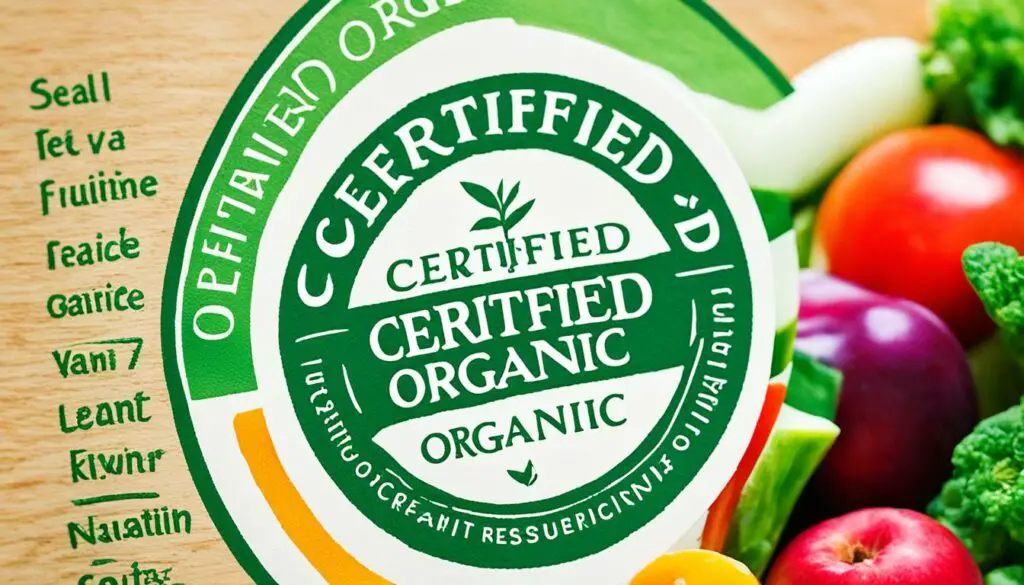Originally posted on February 10, 2024 @ 8:37 pm
Welcome to Whole Foods Market, your go-to destination for all things organic and healthy. As an organic food retailer, we are dedicated to providing you with the highest quality products that meet strict organic standards. So, what exactly is Whole Foods Market and why should you choose us for your grocery needs?
Whole Foods Market is not just your average grocery store. We are a certified organic food retailer, meaning that we prioritize the organic integrity of the products we sell. From the moment our products reach our stores to the moment they are purchased by you, we take every step to ensure that they meet the rigorous organic standards. That’s why we are audited annually and maintain our certification as an organic processing facility.
When you shop at Whole Foods Market, you can trust that our products are free from harmful pesticides, synthetic fertilizers, and genetically modified organisms (GMOs). We believe in the importance of whole foods – foods that have not been heavily processed and retain their essential nutrients, phytochemicals, and fiber. By incorporating organic, minimally processed foods into your diet, you are making a conscious choice for your health and well-being.
At Whole Foods Market, you’ll find a wide range of healthy food options. From fresh fruits and vegetables to whole grains, nuts and seeds, and protein sources like beans and fish, we have everything you need to create nutritious and delicious meals. We also offer an array of unpackaged organic products such as produce, bulk items, meat, bakeries, cheese, and salad bars, all meeting the same strict organic standards.
So, if you’re looking for a grocery store that values organic integrity and provides you with a variety of healthy and organic options, look no further than Whole Foods Market. We are committed to helping you make informed choices for a healthier lifestyle.
Table of Contents
Key Takeaways:
- Whole Foods Market is a certified organic food retailer committed to organic integrity.
- We prioritize whole foods that are minimally processed and retain their nutrients and fiber.
- Our products are free from harmful pesticides, synthetic fertilizers, and GMOs.
- At Whole Foods Market, you’ll find a variety of healthy food options, including fresh produce, whole grains, and protein sources.
- Make Whole Foods Market your destination for a healthier grocery shopping experience.
Understanding Organic Certification

When it comes to organic food, one of the key factors that sets it apart is organic certification. This ensures that the products meet strict standards and uphold organic integrity throughout the entire production process. Let’s take a closer look at what organic certification entails and why it’s important.
What is Organic Certification?
Organic certification involves a thorough evaluation of the plans and production systems in food processing plants. Certified organic products must meet specific criteria established by certifiers accredited by the USDA. These criteria include:
- Organic integrity of sources
- Truth in labeling
- Prevention of contamination
- Prevention of co-mingling
- Verification of cleaning and pest control procedures
These standards ensure that every organic product, from farm to processing facility, adheres to strict guidelines.
Whole Foods’ Commitment to Organic Certification
At Whole Foods Market, organic integrity is taken seriously. Not only do they ensure that their suppliers meet organic certification standards, but they also go the extra mile by extending those standards to their own stores. This means that even unpackaged organic products such as produce, bulk items, meat, bakeries, cheese, and salad bars meet the same rigorous criteria for organic certification.
By upholding these high standards, Whole Foods Market ensures that customers can trust the organic integrity of the products they purchase. This commitment to organic certification sets Whole Foods Market apart as a reliable source for organic ingredients.
| Benefits of Organic Certification | Whole Foods Market |
|---|---|
| Promotes organic integrity | Committed to organic certification |
| Ensures truth in labeling | Transparent labeling practices |
| Prevents contamination and co-mingling | Rigorous cleaning and pest control procedures |
| Supports sustainable and eco-friendly practices | Demonstrates commitment to the environment |
The Benefits of Whole Foods

Whole foods provide numerous benefits for your health and well-being. Unlike heavily processed foods, whole foods retain essential nutrients, phytochemicals, and fiber that are often stripped away during processing. Including a variety of whole foods in your diet can have a positive impact on your overall health and reduce the risk of chronic diseases.
Key Components of Whole Foods
Whole foods encompass a range of natural, minimally processed ingredients. These include:
- Fresh fruits and vegetables: Packed with vitamins, minerals, and antioxidants, fresh produce is a cornerstone of a whole-foods diet.
- Whole grains: Whole grains, such as quinoa, brown rice, and oats, provide fiber, vitamins, and minerals.
- Nuts and seeds: Nutrient-dense and rich in healthy fats, nuts and seeds offer protein, fiber, and essential nutrients.
- Protein sources: Whole foods provide ample protein through sources like beans, fish, eggs, and lean meats.
Eating these whole foods allows you to enjoy the full spectrum of nutrients they provide, enhancing your overall nutrition and well-being.
Health Benefits of Whole Foods
By incorporating whole foods into your diet, you can experience a range of health benefits:
- Nutrient-rich: Whole foods are abundant in essential nutrients, including vitamins, minerals, and antioxidants, which support optimal health and function of your body.
- Fiber: Whole foods contain dietary fiber, which aids in digestion, helps maintain healthy blood sugar levels, and promotes a feeling of fullness, aiding in weight management.
- Lower risk of chronic diseases: Studies have shown that consuming a diet rich in whole foods is associated with a reduced risk of chronic diseases such as cardiovascular disease, cancer, and type 2 diabetes.
Eating whole foods as part of a balanced diet can contribute to your long-term health and well-being.
“Let food be thy medicine, and medicine be thy food.” – Hippocrates
| Whole Foods | Benefits |
|---|---|
| Fresh fruits and vegetables | Provide essential vitamins, minerals, and antioxidants |
| Whole grains | Rich in fiber, vitamins, and minerals |
| Nuts and seeds | Offer healthy fats, protein, and essential nutrients |
| Protein sources | Provide essential amino acids and support muscle growth and repair |
Opting for whole foods instead of heavily processed alternatives can significantly improve your overall nutrition and well-being.
Choosing Whole Foods at the Grocery Store

When it comes to shopping for whole foods, it’s essential to know what to look for. By understanding the indicators of whole foods, you can make healthier choices for your diet. Here are some key factors to consider:
1. Whole Grains:
When selecting whole grains, check the ingredient list to ensure “100 percent whole” or “whole grain” is listed as the first or second ingredient. This indicates that the product contains the entire grain, including the bran, germ, and endosperm, providing maximum nutritional value.
2. Fresh Fruits and Vegetables:
Opt for fresh fruits and vegetables whenever possible. These nutrient-rich foods are packed with vitamins, minerals, and fiber. Aim to include a variety of colorful options to maximize your intake of essential nutrients. Remember to wash them thoroughly before consumption.
3. Protein Sources:
Protein is an important component of a balanced diet. Choose protein sources that are lean and minimally processed. Good options include lean meats, poultry, fish, beans, lentils, nuts, and seeds. If opting for canned beans or legumes, ensure they have minimal or no added sodium.
4. Canned or Frozen Options:
Canned or frozen whole foods can be convenient alternatives to fresh produce. When selecting canned options, choose ones without added sugar or sodium. For frozen foods, ensure they are free from added sauces or preservatives. These options can be just as nutritious and are great for meal planning and reducing food waste.
By paying attention to these indicators, you can make informed choices while shopping for whole foods. It’s also important to read product labels, checking for saturated fat, added sugar, and sodium content. Starting your shopping trip in the outer aisles of the grocery store, where whole foods are usually located, can help you find the best options for your health and wellness.
| Category | Indicators |
|---|---|
| Whole Grains | “100 percent whole” or “whole grain” as first or second ingredient |
| Fresh Fruits and Vegetables | Colorful options, no added sauces or preservatives |
| Protein Sources | Lean and minimally processed, minimal or no added sodium |
| Canned or Frozen Options | No added sugar or sodium, free from added sauces or preservatives |
Whole Foods for Weight Loss

When it comes to weight loss, the types of foods you consume play a crucial role. Processed foods, which are often high in sugar and salt, can contribute to increased calorie intake and weight gain. To achieve your weight loss goals, it’s essential to cut out processed foods from your diet.
Studies have shown that diets high in processed foods are associated with a higher risk of heart disease and stroke. These foods are often calorie-dense and lacking in important nutrients. By eliminating processed foods, you can save calories and create a calorie deficit, promoting weight loss.
On the other hand, adopting a whole-foods diet can support weight loss and weight maintenance. Whole foods, such as fresh fruits and vegetables, whole grains, nuts and seeds, and lean protein sources, are typically lower in calories and higher in fiber content. The fiber content of whole foods helps control hunger, contributes to a healthier weight, and keeps you feeling satisfied for longer.
Switching to whole foods not only helps with weight loss but also improves overall health. These nutrient-dense foods provide essential vitamins, minerals, and antioxidants that support optimal well-being.
A balanced and whole-foods-based diet can help you achieve your weight loss goals while nourishing your body with the nutrients it needs.
The Impact of Processed Foods on Weight Loss
Processed foods often contain added sugars and high levels of sodium, both of which can lead to weight gain. These ingredients contribute to increased calorie intake without providing substantial nutritional value. Additionally, the high sugar content in processed foods can cause blood sugar spikes and crashes, leading to increased hunger and cravings.
By reducing or eliminating processed foods from your diet, you can lower your overall calorie intake and reduce the consumption of empty calories. This shift allows you to focus on consuming nutrient-dense whole foods that provide the necessary energy for your body without unnecessary additives.
| Processed Food | Calories per Serving | Sugar per Serving | Sodium per Serving |
|---|---|---|---|
| Soda | 140 | 39g | 35mg |
| Potato Chips | 152 | 1.4g | 180mg |
| Cookies | 160 | 12g | 105mg |
Ditching processed foods like soda, potato chips, and cookies can significantly reduce your calorie, sugar, and sodium intake, aiding in weight loss efforts.
The Power of Whole Foods for Weight Loss
Whole foods, on the other hand, are packed with essential nutrients and are naturally low in calories. They provide sustained energy, promote satiety, and help control hunger cravings. Incorporating whole foods into your diet can support weight loss and weight management by providing adequate nutrition while being mindful of calorie intake.
Aim to fill your plate with a variety of whole foods, such as:
- Fresh fruits and vegetables
- Whole grains, like quinoa and brown rice
- Nuts and seeds
- Lean proteins like chicken, fish, and tofu
These whole foods are rich in fiber, vitamins, and minerals, fueling your body with nutrients while keeping you feeling satisfied. Remember to watch portion sizes and listen to your body’s hunger and fullness cues.
By embracing a whole-foods-based approach to eating, you can achieve your weight loss goals while nourishing your body with the essential nutrients it needs for optimal health and well-being.
Whole Foods and Chronic Disease Prevention

Consuming a diet rich in whole foods, particularly plant-based foods, has been scientifically proven to reduce the risk of chronic diseases. Numerous studies have found that a plant-based diet can lower the risk of dying from cardiovascular disease and decrease the overall risk of mortality.
A plant-based diet comprises whole foods, such as whole grains, vegetables, fruits, and healthy fats, which have been associated with a lower risk of various conditions, including cancer, type 2 diabetes, heart disease, and stroke. These nutrient-dense foods provide vital antioxidants, phytochemicals, fiber, and essential nutrients that support overall health and well-being.
On the other hand, diets high in red and processed meats, as well as sugary beverages, have been consistently linked to a higher risk of developing chronic conditions, including those mentioned above. By focusing on a plant-based whole foods approach, individuals can significantly reduce their risk and improve their long-term health outcomes.
“A plant-based diet can be a powerful tool for preventing chronic disease and promoting optimal health and well-being.”
The Benefits of a Plant-Based Diet in Chronic Disease Prevention
- Plant-based foods are rich in essential nutrients, such as vitamins, minerals, and antioxidants, which help protect against the development of chronic diseases.
- Whole grains provide fiber, which aids in digestion and helps regulate blood sugar levels, reducing the risk of type 2 diabetes.
- Fruits and vegetables are packed with antioxidants that help reduce inflammation and promote heart health.
- Healthy fats from sources like avocados, nuts, and seeds contribute to a healthy cardiovascular system.
A plant-based diet not only prevents chronic diseases but also supports overall well-being. It offers a wide range of health benefits, including weight management, improved digestion, and enhanced immune function.
| Chronic Disease | Plant-Based Diet | Red and Processed Meats |
|---|---|---|
| Cardiovascular Disease | Reduced risk | Increased risk |
| Cancer | Lower risk | Higher risk |
| Type 2 Diabetes | Lower risk | Increased risk |
As the table highlights, a plant-based diet can play a crucial role in preventing chronic diseases, while diets high in red and processed meats can elevate the risk. By prioritizing whole foods and embracing a plant-centric approach, individuals can proactively safeguard their health and reduce the burden of chronic diseases.
Managing Chronic Diseases with Whole Foods

A whole-foods diet that emphasizes plant-based foods can be beneficial for managing and treating chronic conditions such as type 2 diabetes, heart disease, chronic kidney disease, and autoimmune diseases. Whole foods are packed with essential nutrients, vitamins, minerals, and antioxidants that support overall health and help manage these conditions.
Embracing a plant-based diet, rich in whole foods, provides numerous benefits for chronic disease management. These foods offer a natural way to limit fat and calorie intake, contributing to better management of chronic diseases.
For individuals with type 2 diabetes, a plant-based diet that focuses on whole foods can help regulate blood sugar levels and improve insulin sensitivity. Whole grains, legumes, fruits, and vegetables provide a steady release of carbohydrates, preventing blood sugar spikes. They also offer valuable fiber, aiding digestion and promoting satiety.
Heart disease, a leading cause of death worldwide, can be effectively managed through a whole-foods approach. Plant-based foods are naturally low in saturated fat and cholesterol, improving heart health and reducing the risk of cardiovascular events. Incorporating fruits, vegetables, whole grains, and healthy fats, such as those found in nuts and seeds, can help lower blood pressure, reduce inflammation, and support heart function.
Additionally, whole foods play a vital role in managing chronic kidney disease by providing essential nutrients while limiting phosphorus and sodium intake. Foods such as whole grains, fruits, and vegetables are low in these minerals, offering a kidney-friendly option for individuals with compromised kidney function.
Autoimmune diseases, which result from an overactive immune response, can also benefit from a whole-foods diet. Certain foods can trigger inflammation and exacerbate symptoms. Whole foods, on the other hand, have anti-inflammatory properties, providing relief and improving overall well-being.
“A whole-foods diet rich in plant-based foods offers a powerful tool for managing chronic diseases and promoting overall health.”
By adopting a plant-based diet filled with whole foods, individuals can take control of their chronic conditions and improve their quality of life. The abundance of nutrients and antioxidants in whole foods supports overall health and helps manage these diseases effectively.
| Chronic Condition | Recommended Whole Foods |
|---|---|
| Type 2 Diabetes | Fruits, vegetables, whole grains, legumes |
| Heart Disease | Fruits, vegetables, whole grains, nuts, seeds |
| Chronic Kidney Disease | Low-phosphorus and low-sodium whole foods |
| Autoimmune Diseases | Foods with anti-inflammatory properties such as fruits, vegetables, whole grains |
It’s important to note that while a plant-based whole-foods diet can offer great benefits, it is always advisable to consult with a healthcare professional or registered dietitian before making significant changes to your diet, especially if you have any underlying health conditions or are taking medications.
Whole Foods and Digestive Health
When it comes to digestive health, incorporating whole foods into your diet can have a significant impact. Whole foods, especially those high in fiber such as whole grains, legumes, fruits, and vegetables, play a vital role in supporting good gastrointestinal health and digestion.
A diet rich in fiber has been associated with lower rates of chronic diseases and improved digestive function. Fiber acts as a natural regulator, promoting regular bowel movements and preventing constipation. Additionally, fiber promotes a healthy gut environment by nourishing beneficial gut bacteria and supporting overall gut health.
Including a variety of whole foods in your daily meals is an excellent way to meet your recommended daily fiber intake and maintain optimal digestive health. Aim to incorporate foods like whole grain bread, brown rice, lentils, berries, leafy greens, and cruciferous vegetables into your meals.
Promoting Fiber Intake
To support your fiber intake, consider the following tips:
- Choose whole grain options like whole wheat pasta, quinoa, and oats.
- Include plenty of fruits and vegetables in your meals and snacks.
- Opt for legumes such as beans, lentils, and chickpeas as a source of plant-based protein.
- Snack on nuts and seeds to add fiber and healthy fats to your diet.
By incorporating these whole foods into your diet, you’ll not only support your digestion but also enjoy the numerous health benefits associated with a high-fiber diet.
Choosing whole foods rich in fiber can promote gastrointestinal health and support efficient digestion. Make sure to include a variety of whole grains, legumes, fruits, and vegetables in your diet to support optimal digestive health.
Boosting the Immune System with Whole Foods
A healthy, balanced diet that includes a variety of whole foods is essential for supporting immune system health. Whole foods provide the body with the necessary nutrients, vitamins, and minerals needed to boost the body’s defenses against illnesses and infections. Incorporating whole foods into your daily meals and snacks can help strengthen your immune system and support overall well-being.
Whole foods are rich in immune-boosting nutrients such as vitamin C, zinc, and selenium. Vitamin C, found in fruits like oranges and strawberries, helps stimulate the production of white blood cells, which are crucial in fighting off infections. Zinc, present in foods like lean meats and legumes, supports the functioning of immune cells and aids in wound healing. Selenium, found in foods like Brazil nuts and seafood, plays a role in protecting the body from oxidative stress and supports immune function.
On the other hand, a diet lacking in fruits and vegetables and high in ultra-processed foods can have a negative impact on the immune system. Ultra-processed foods often lack essential nutrients and are linked to inflammation in the body. Chronic inflammation can weaken the immune system and make the body more susceptible to illnesses and infections.
By including a wide variety of whole foods in your diet, you can ensure that your body receives the necessary nutrients to support a strong immune system. Aim to incorporate colorful fruits and vegetables, whole grains, lean proteins, and healthy fats into your meals. This variety will provide a range of vitamins, minerals, antioxidants, and phytochemicals that work together to enhance immune function and reduce inflammation.
Remember to prioritize foods that are minimally processed and free from added sugars and unhealthy fats. These additions can compromise the immune system and have a detrimental effect on overall health. Choose whole foods in their natural form whenever possible and opt for organic options to minimize exposure to pesticides and other harmful chemicals.
“A healthy outside starts from the inside.” – Robert Urich
Immune-Boosting Whole Foods
Here are some immune-boosting whole foods you can incorporate into your diet:
- Dark leafy greens such as spinach and kale, rich in vitamins A, C, and K
- Citrus fruits like oranges and grapefruits, packed with vitamin C
- Berries like strawberries and blueberries, high in antioxidants
- Garlic, known for its immune-strengthening properties
- Ginger, which has anti-inflammatory and antioxidant effects
- Yogurt and kefir, containing probiotics that support gut health and immunity
- Almonds and sunflower seeds, great sources of vitamin E and healthy fats
- Fatty fish like salmon and trout, rich in omega-3 fatty acids
- Turmeric, a spice with anti-inflammatory and antioxidant properties
Incorporating these immune-boosting whole foods into your diet can provide the nutrients and variety necessary for a strong immune system. Prioritize whole foods and make them a staple in your daily meals to support optimal immune system health.
| Whole Food | Immune-Boosting Nutrients |
|---|---|
| Dark leafy greens | Vitamins A, C, K |
| Citrus fruits | Vitamin C |
| Berries | Antioxidants |
| Garlic | Immune-strengthening properties |
| Ginger | Anti-inflammatory, antioxidant effects |
| Yogurt and kefir | Probiotics for gut health and immunity support |
| Almonds and sunflower seeds | Vitamin E, healthy fats |
| Fatty fish | Omega-3 fatty acids |
| Turmeric | Anti-inflammatory, antioxidant properties |
Conclusion
Whole Foods Market is the ideal destination for health-conscious individuals who are seeking organic, minimally processed, and healthy options for their grocery shopping needs. As a certified organic grocery store, Whole Foods Market prioritizes the integrity of their products, ensuring that customers can trust the organic certifications and quality of the items they purchase.
By choosing Whole Foods Market, you have access to a wide range of whole foods that can significantly benefit your overall health and well-being. Incorporating whole foods into your diet allows you to enjoy numerous advantages, including the prevention and management of chronic diseases, weight loss, improved digestive health, and a strengthened immune system.
With the variety of organic food options available, Whole Foods Market empowers you to make healthier choices and adopt a lifestyle that prioritizes your well-being. Whether you are searching for fresh, organic produce, whole grains, or protein sources, Whole Foods Market offers an extensive selection of options that meet your dietary needs.
When it comes to finding a whole foods grocery store that provides organic food and healthy options, Whole Foods Market is the ideal solution. Their commitment to organic integrity, quality assurance, and focus on whole foods make them the go-to destination for individuals looking to embrace a healthier lifestyle and make informed food choices.
FAQ
What is Whole Foods Market?
Whole Foods Market is an organic food retailer that specializes in providing all-natural and sustainably sourced products. It is known for offering a wide range of healthy food options, including fresh produce, natural and organic products, and specialty items.
What does it mean for a grocery store to be certified organic?
Certification as an organic food retailer ensures that the products sold in the store meet strict organic standards. Whole Foods Market is certified organic, meaning they take steps to ensure the organic integrity of the products they sell from the time they reach their stores until they are purchased by customers.
What are the benefits of consuming whole foods?
Whole foods, which include fresh fruits and vegetables, whole grains, nuts, seeds, and minimally processed protein sources, are rich in essential nutrients, fiber, and phytochemicals. Consuming whole foods is associated with a lower risk of chronic diseases such as cardiovascular disease, cancer, and type 2 diabetes.
How can I choose whole foods while grocery shopping?
When shopping for whole foods, look for indicators such as “100 percent whole” or “whole grain” listed as the first or second ingredient for whole grains. Choose fresh fruits and vegetables, and for canned or frozen options, ensure they do not have added ingredients like sugar or sodium. Reading ingredient lists, checking nutrition labels, and starting your shopping trip in the outer aisles can help you find the best whole food options.
Can consuming whole foods aid in weight loss?
Yes, cutting out processed foods and incorporating whole foods into your diet can contribute to weight loss. Whole foods are typically lower in calories, higher in fiber, and can help control hunger, leading to better weight management.
How do whole foods contribute to chronic disease prevention?
Diets rich in whole foods, particularly plant-based foods, have been shown to reduce the risk of chronic diseases such as cardiovascular disease, cancer, and type 2 diabetes. Whole foods provide essential nutrients and phytochemicals that support overall health and well-being.
Can whole foods help manage chronic diseases?
Yes, a whole-foods diet, especially one that emphasizes plant-based foods, can be beneficial for managing and treating chronic conditions such as type 2 diabetes, heart disease, chronic kidney disease, and autoimmune diseases. Whole foods provide essential nutrients, vitamins, minerals, and antioxidants that support overall health and help manage these conditions.
How do whole foods support digestive health?
Whole foods, especially those high in fiber like whole grains, legumes, fruits, and vegetables, support good digestive health. A diet high in fiber has been linked to lower rates of chronic disease and improved digestion. Fiber helps regulate bowel movements, prevent constipation, and promote a healthy gut environment.
Can consuming whole foods boost the immune system?
Yes, a healthy, balanced diet that includes a variety of whole foods can support immune system health. Whole foods provide essential nutrients such as vitamin C, zinc, and selenium, which can boost the body’s defenses. Additionally, a diet lacking in fruits and vegetables and high in processed foods can negatively affect gut health and elevate inflammation, both of which can impair the immune system.
What is the advantage of shopping at Whole Foods Market for whole foods?
Whole Foods Market is a certified organic grocery store committed to providing organic and minimally processed options. They offer a wide selection of fresh produce, natural and organic products, and specialty items, making it a convenient one-stop shop for all your healthy grocery needs.
Source Links
- https://www.nyc.gov/site/doh/health/health-topics/whole-foods.page
- https://www.wholefoodsmarket.com/tips-and-ideas/archive/your-certified-organic-grocery-store
- https://www.everydayhealth.com/diet-nutrition/whole-foods-diet/
See also:
Leave a Reply